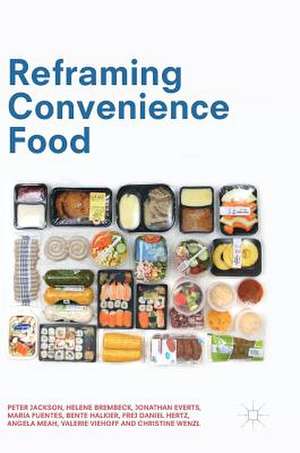Reframing Convenience Food
Autor Peter Jackson, Helene Brembeck, Jonathan Everts, Maria Fuentes, Bente Halkier, Frej Daniel Hertz, Angela Meah, Valerie Viehoff, Christine Wenzlen Limba Engleză Hardback – 6 iun 2018
This book questions the simplistic view that convenience food is unhealthy and environmentally unsustainable. By exploring how various types of convenience food have become embedded in consumers’ lives, it considers what lessons can be learnt from the commercial success of convenience food for those who seek to promote healthier and more sustainable diets. The project draws on original findings from comparative research in the UK, Denmark, Germany and Sweden (funded through the ERA-Net Sustainable Food programme). Reframing Convenience Food avoids moral judgments about convenience food, and instead provides a refreshingly novel perspective guided by an understanding of everyday consumer practice. It will appeal to those with an interest in the sociology and politics behind health, consumerism, sustainability and society.
| Toate formatele și edițiile | Preț | Express |
|---|---|---|
| Paperback (1) | 637.78 lei 6-8 săpt. | |
| Springer International Publishing – 8 ian 2019 | 637.78 lei 6-8 săpt. | |
| Hardback (1) | 647.59 lei 6-8 săpt. | |
| Springer International Publishing – 6 iun 2018 | 647.59 lei 6-8 săpt. |
Preț: 647.59 lei
Preț vechi: 761.87 lei
-15% Nou
Puncte Express: 971
Preț estimativ în valută:
123.93€ • 128.60$ • 103.58£
123.93€ • 128.60$ • 103.58£
Carte tipărită la comandă
Livrare economică 18 martie-01 aprilie
Preluare comenzi: 021 569.72.76
Specificații
ISBN-13: 9783319781501
ISBN-10: 3319781502
Pagini: 262
Ilustrații: XI, 274 p. 13 illus., 8 illus. in color.
Dimensiuni: 148 x 210 mm
Greutate: 0.62 kg
Ediția:1st ed. 2018
Editura: Springer International Publishing
Colecția Palgrave Macmillan
Locul publicării:Cham, Switzerland
ISBN-10: 3319781502
Pagini: 262
Ilustrații: XI, 274 p. 13 illus., 8 illus. in color.
Dimensiuni: 148 x 210 mm
Greutate: 0.62 kg
Ediția:1st ed. 2018
Editura: Springer International Publishing
Colecția Palgrave Macmillan
Locul publicării:Cham, Switzerland
Cuprins
1. Introduction.- 2. A Short History of Convenience Food.- 3. Convenience Food as a Contested Category.- 4. The Normalization of Convenience Food.- 5. The Temporalities of Convenience Food.- 6. The Spatialities of Convenience Food.- 7. The Moralization of Convenience Food.- 8. Cooking and Convenience.- 9. Convenience, Health and Sustainability.- 10. Conclusions.
Recenzii
“This is to be applauded for it retains intellectual integrity while providing relevant evidence that supports educating nonacademic attitudes about the matter, especially among those who are spending public funds. … The book will also be informative for policy makers and practitioners, and educative for students, enabling them to see the argument for reframing common sense assumptions—including some with which they themselves might have started their undergraduate studies.” (Anne Murcott, Review of Agricultural, Food and Environmental Studies, Vol. 100, 2019)
Notă biografică
Peter Jackson is Professor of Human Geography at the University of Sheffield, UK
Helene Brembeck is Professor of Ethnology at the University of Gothenburg, Sweden
Jonathan Everts is Professor of Human Geography at the University of Halle-Wittenberg, Germany
Maria Fuentes is Senior Researcher at the University of Gothenburg, Sweden
Bente Halkier is Professor of Sociology at the University of Copenhagen, Denmark
Frej Daniel Hertz is a PhD student at Roskilde University, Denmark
Angela Meah is Research Fellow at the University of Sheffield, UK
Valerie Viehoff is completing a PGCE at University College London, UK
Christine Wenzl is a PhD student at the University of Bonn, Germany
Helene Brembeck is Professor of Ethnology at the University of Gothenburg, Sweden
Jonathan Everts is Professor of Human Geography at the University of Halle-Wittenberg, Germany
Maria Fuentes is Senior Researcher at the University of Gothenburg, Sweden
Bente Halkier is Professor of Sociology at the University of Copenhagen, Denmark
Frej Daniel Hertz is a PhD student at Roskilde University, Denmark
Angela Meah is Research Fellow at the University of Sheffield, UK
Valerie Viehoff is completing a PGCE at University College London, UK
Christine Wenzl is a PhD student at the University of Bonn, Germany
Textul de pe ultima copertă
This book questions the simplistic view that convenience food is unhealthy and environmentally unsustainable. By exploring how various types of convenience food have become embedded in consumers’ lives, it considers what lessons can be learnt from the commercial success of convenience food for those who seek to promote healthier and more sustainable diets. The project draws on original findings from comparative research in the UK, Denmark, Germany and Sweden (funded through the ERA-Net Sustainable Food programme). Reframing Convenience Food avoids moral judgments about convenience food, and instead provides a refreshingly novel perspective guided by an understanding of everyday consumer practice. It will appeal to those with an interest in the sociology and politics behind health, consumerism, sustainability and society.
Caracteristici
Uses comparative ethnographic evidence , based on contemporary first-hand fieldwork in four European countries Looks at case studies to assess the growth, development, and use of highly prepared foods since the 1950s The evidence-based research has far reaching economic, ecological, and public health implications
